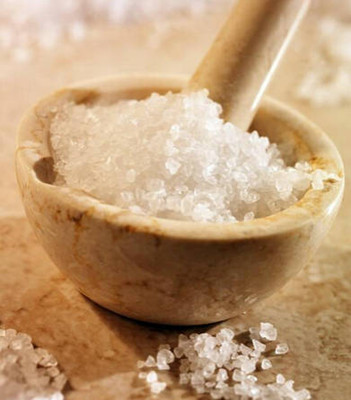(单词翻译:单击)
Dear A Moment of Science,I know why the ocean is still salty: evaporated water leaves thesalt behind.
亲爱的《科学一刻》我知道为什么海洋依旧是咸的了:水分蒸发掉,留下了盐。
But how did it get salty in the first place? SaltyDog.
但是一开始盐是怎么进去的呢?咸味鸡尾酒。
According to one hypothesis, oceans formed at least 500 million years ago when water vapor andother gasses escaping from the Earth's interior gradually formed the atmosphere and cloudssurrounding the planet.
有种假设,海洋在至少五亿年前形成。那时水蒸气和其他气体渐渐从地球内部逸出,形成了围绕地球的大气层和云。
As the earth cooled below the boiling point of water, rain began to fall, andkept falling for centuries.
当地球冷却到水沸点以下,开始下雨,下了好几个世纪。

Eventually the rainfall filled the Earth's hollows and formed oceans.
最后,雨水填满了地球的低洼形成了海洋。
In their infant state these oceans were not nearly as salty as they are today.
在海洋形成初期,它们还不像今天这样咸。
As the initial rainsswept over the planet's surface and filtered down to the hollows, the rushing waters picked upchemicals from erosion of the Earth's crust.
最初的雨席卷地球表面后汇入低洼,激流带进去了地壳腐蚀处的化学成分。
These chemicals included sodium, which is one of themain ingredients of salt.
这些化学成分包括钠,那正是盐的主要成分。
The other main ingredient, chlorine, came from the solid and gaseousfallout of land and ocean floor volcanoes.
另一个主要成分,氯,来自陆上海底火山喷发产生的尘土及气体。
Over hundreds of millions of years the steady flow ofchemical-rich rivers and streams and the eruption of volcanoes and undersea vents combined toincrease the oceans' salt content.
经过数亿年,富含化学物质的河流、陆上海底的火山喷发物,合在一起增加了海洋的盐分。
This does not mean, however, that the oceans' saltiness is constantly increasing.
然而,这并不意味着海洋会持续变咸下去。
Scientists believethat ocean salinity reached a plateau hundreds of millions of years ago, when roughly the sameamount of salt fed into the oceans was deposited as sediment on the ocean floor.
科学家认为,海洋盐度在数亿年前就达到平稳,当时盐注入海洋后,在海底形成了大体等量的沉积物。


